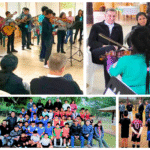
by f. Luis Casasús, General Superior of th eIdente missionaries
New York, September 22, 2019, Twenty-fifth Sunday in Ordinary Time.
Amos 8:4-7; First Letter to Timothy 2:1-8; Saint Luke 16: 1-13.
This is the question that, in the New Testament many persons put to themselves. The crowd, the publicans and the soldiers address John the Baptist asking: What must we do? The rich farmer of the parable puts to himself the same question: What must I do because I do not know where to place my harvest? (Lk 12:17). The listeners of Peter’s discourse on Pentecost day put it to themselves: Brothers, what must we do? It is a question of anyone who finds himself/herself in front of a decisive choice in life, just for this moment or for the rest of his/her existence.
Sometimes, challenging situations lead to the paralysis of initiative; this can be caused by laziness or fear, by a lack of analytical ability, or a lack of information…and, ultimately, by a lack of true prayer.
Perplexities in choice may result in pathologies like an aversion to making decisions (this is called apophasophobia). At times we engage in responses predetermined by the prior experience or customs, or by behavioral patterns that displace or delay choice.
But our life, particularly our spiritual life is a fabric of choices. To choose implies to reject something, often to admit that a deep change in our individualistic way of thinking and making decisions is indispensable. Ultimately, a true disciple of Christ should reformulate any question as many Catholic and Protestant do: What would Jesus do? inspired by the popular book Imitatio Christi (The Imitation of Christ, Thomas à Kempis, 1380-1471).
One of the most practical questions in our spiritual life, both for believers and unbelievers, is, What shall I do to be saved? in other words, How can I live a full and fulfilled life…in this very moment? Of course, this is question we cannot answer just with our intelligence or our willpower. Even if we have been faithful to God in our stewardship, St Paul reminds us that there is nothing to boast about because it is God who worked in and through us.
Only through our unitive purification we are able to do it. Of course, this means that we have to continuously seek the assistance of God, this is why today’s Gospel text is so relevant and useful. The Second Reading concludes with a recommendation: I wish, then, that in every place the people should pray, lifting up holy hands, without anger or argument.
What does Jesus teach us with his parable?
1. We are not owners but administrators. Man is a pilgrim, lives as a stranger in a world not his own. He is a wanderer who traverses the desert. He owns a lot of land as much as his feet trod. But as he steps forward then it is not his anymore.
We are not owners but administrators of God’s goods. This is an often insistently repeated affirmation of the Church’s Fathers. Saint Basil said: Are not you a thief when you consider your own the riches of this world, riches are given to you only to administer?
We have to administer our imagination, time, health, talents, the grace and forgiveness we receive, even our suffering and drawbacks.
This explains why the administrator is a person who appears often in the parables of Jesus. We have one faithful and wise (Mt 24:25) who does not act arbitrarily, but uses the goods entrusted to him according to will of the owner. We also have another one who, in the absence of the Lord, takes advantage of his position to make himself the owner and getting drunk and dishonors the other servants (Lk 12:42-48).
There is the enterprising administrator, who commits himself, has the courage to risk and makes the master’s capital gain profit and one who is a slacker and a sloth. And the shrewd administrator spoken of in today’s Gospel.
God puts a treasure in the hand of each person. Do I believe it? We are often too worry about ourselves to realize that we would be able to meet the needs of our neighbor:
A sage, who roamed dejected,
Poor, and wretched, it is said,
That one day, his wants being fed
By the herbs which he collected,
Is there one (he thus reflected)
Poorer than I am to-day?
Turning round him to survey,
He his answer got, detecting
A still poorer sage collecting
Even the leaves he threw away (Calderón de la Barca, Spanish writer, 1600-1681).
In the words of a South African boy born with HIV who became an advocate for children with that illness before he died at about age 12: Do all you can, with what you have, in the time you have, in the place where you are.
We should not underestimate the impact of a small deed. Think of a turning point in your own life in which another person did something objectively small, helped you fill out a form, offered an encouraging word, invited you to a meeting, mentioned an opportunity… that had big benefits for you. And, most importantly, the answer of the Holy Spirit is to show the generous person new ways, new and deeper modes of helping others. He will give us His Holy Spirit and He will work wonders in and through us.
2. Many of us in our secular or professional life are doing very well, but how is it that not always we use our God-given talents and resources to serve the others and for the proclamation of the Gospel? Jesus points out that the children of this world are more astute in dealing with their own kind of people than are the children of light. That is the point that Jesus praises.
Surely we do not use all our resources, all our experience and all the grace we receive to spread the Gospel. We see ourselves reflected in this words of Christ: You can predict the weather by looking at the earth and sky, but you don’t really know what’s going on right now (Lk 12: 56). We, like the dishonest administrator, have the means, the grace and the light to know what should we do now for the kingdom. He did not ask the opinion of anybody because he already knows all the tricks of the trade. He understood by himself what is the right choice and immediately goes into action.
An innocent example of the children of this world being enterprising is the department store clerk who had broken all sales records. Modestly disclaiming credit, he explained to his boss, “A customer came in, and I sold him some fishhooks. “You will need a line for those hooks,” I said, and sold him some line. Then I told him, “You have to have a rod to go with the line,” and I sold him a rod. “You ought to have a boat so you can use your new rod in deep water,” I suggested, and sold him a boat. Next I told him, “You’ll need a boat trailer” and he fell for that too. Finally, I said, “How will you pull the trailer without a car? and guess what? He bought my car.” And the boss said, “But I assigned you to the greetings card department.” “That is right,” the salesman nodded. “This customer came to me for a get-well card for his girl, who had a broken hip. When I heard that I said to him, ‘You haven’t got anything to do for six weeks, so you might as well go fishing’.”
Of course, Jesus is not encouraging us to imitate the dishonest actions of the shrewd manager, but to react, changing our life, already now. There is a sense of urgency; the Kingdom is here and we are to live accordingly.
This is the wise choice that Jesus encourages to do, and he ensures the success of the operation: the benefitted persons in this life will always remain by our side and they will bear witness in our favor on the day in which money will have no value.
The administrator was smart because he understood on which to bet on: not on goods, products that he was entitled to, that could rot or stolen, but on friends. He knew how to renounce the first in order to conquer for himself the second. There is no greater gift than the love of a person, either divine or human.
Can I say that I have used all the means for the service of the gospel and my fellowmen? Have I given myself selflessly for others so that God is glorified? Or have I simply served myself and a few loved ones whom I am so attached to? When we only care for them, we care for ourselves because our happiness is dependent on theirs.
How could he get instant friends? He visited his master’s debtors one by one and reduced their debts (a sure way to win friends and influence people, even in our day). To them, of course, he immediately became a good guy. Even his master, who got cheated out of some of his money, was impressed with the steward for looking out for himself so well.
3. As missionary disciples, we can learn from the dishonest steward how to treat others. Even though the dishonest manager is still sinner who is looking out for his own interests, he models behavior the disciples can emulate. Instead of simply being a victim of circumstance, he transforms a bad situation into one that benefits him and others. By reducing other people’s debts, he creates a new set of relationships based not on the vertical relationship between lenders and debtors, but on the reciprocal and egalitarian relationships of friends.
He was shrewd in that he seized an opportunity while he still had time to act. He interpreted the signs: his days were numbered. He was going to get fired. So he quickly went into action, using his authority while he still had time, to get on the good side of his master’s debtors.
What Jesus would like us to understand is that the only shrewd way of using the goods of this world is to use them to help others, to make them friends. Of course, the most perfect way to help our neighbor is to draw him closer to God, even though we have to do it with the pedagogy of Christ.
On numerous occasions, we see how St Paul used tact, diplomacy and gentleness to win over his audience, as when he said: My brothers, I am quite certain that you are full of good intentions, perfectly well instructed and able to advise each other (Rom 15: 14). In today’s Second Reading, he asks to Timothy and the entire Church for the help of their prayer. By so doing, he made his audience his friends. He knew that by scolding, reprimanding or putting the others down would only incur their wrath, resentment and resistance.
Some of us, instead of being compassionate, gentle and affirming with those under our care, tend to be authoritative, commanding and often discouraging and negative towards them. In much the same way as the dishonest manager, we need to use human skills to get the message across, especially in difficult situations. The medium is as important as the content. The truth must always be presented in love and with love if it were to be heard. Shouting, ranting, scolding and blaming will not get us very far. We only instill fear in and fear kills all creativity and resourcefulness. Allow me to illustrate the opposite attitude with a real example.
The Yoruba people of West Africa have a way of responding to people who deviate from the social norms of their community. When an offender is caught, he or she is brought in the early morning hours under a hut, usually at the center of the village. He or she is asked to stay under the hut until dusk. Each member of the community comes by on their way to their fields to confront the offender. Instead of telling him or her how terrible the action was, each person thinks of a specific case when the offender behaved positively and expresses the personal satisfaction the speaker gained from that experience. He or she would end: I want to thank you for the positive impact you made on my life then, and I know that you are capable of making many more people experience the joy and satisfaction I experienced when you did that for me. This method is not to deny that a crime was committed nor does it negate the risk of a crime being committed. Instead, it reinforces the character and values with which, it is believed, everyone is endowed.











